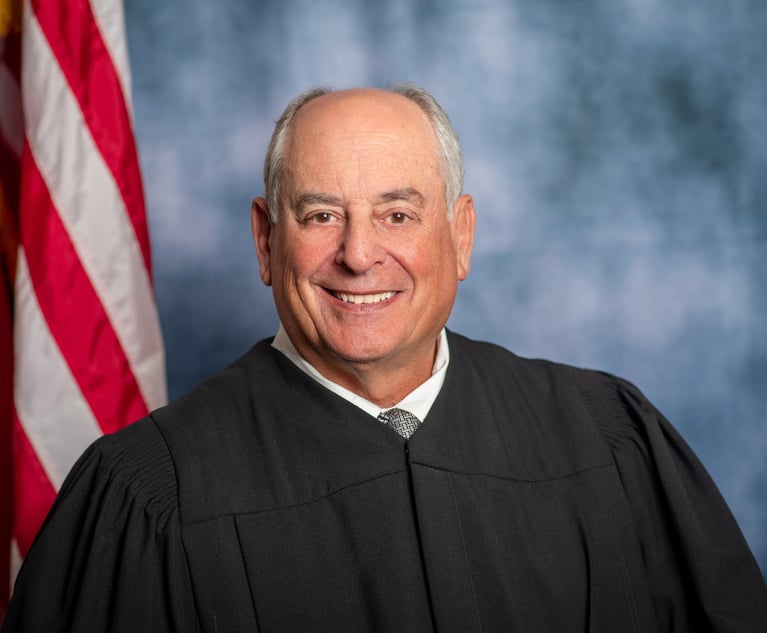 Chief Justice Harold Melton, Supreme Court of Georgia (Photo: John Disney/ALM)
Chief Justice Harold Melton, Supreme Court of Georgia (Photo: John Disney/ALM)High Court Says No to Lifetime Monitoring for Sex Offenders
“It's going to affect a lot of people,” said Mark Yurachek, who made the winning argument against adding lifetime electronic monitoring for sex offenders who have already served their sentences.
March 05, 2019 at 11:48 AM
4 minute read
The winning lawyer said he sees broad implications for a Georgia Supreme Court decision Monday striking down a law requiring lifelong electronic monitoring for certain convicted sex offenders who have served their sentences.
“It's going to affect a lot of people,” said Mark Yurachek, who argued the appeal for Joseph Park. He said others similarly situated should contact their local sheriff. “I don't think those offenders any longer can be subject to the monitoring requirement,” Yurachek added.
 Mark Yurachek (Courtesy photo)
Mark Yurachek (Courtesy photo)
In a unanimous opinion written by Chief Justice Harold Melton, the high court ruled that Georgia Code § 42-1-14 (e) “authorizes a patently unreasonable search that runs afoul of the protections afforded by the Fourth Amendment to the United States Constitution.” Melton said the court found that requiring someone to wear an electronic monitor permanently “cannot stand under the Fourth Amendment, at least with respect to individuals who have completed their criminal sentences.”
The requirement amounts to a lifelong search imposed after a person has completed the sentence and probation imposed, Melton said. No small factor in the equation is the requirement that the offender pay for the lifelong monitoring.
“It really seems like the first cousin of executing someone and then sending the family the bill for the bullet,” Yurachek said. “I don't think anybody should be paying for the government to search their home.”
Attorney General Chris Carr said in an email from a spokesman, “We have reviewed the Court's opinion and respect its decision.”
Park was convicted in 2003 in Douglas County of child molestation and nine counts of sexual exploitation of a minor. He was sentenced to 12 years in prison, with eight to serve. Shortly before Park was released from prison in 2011, the Sex Offender Registration Review Board classified him as a “sexually dangerous predator.” Section (e) of § 42-1-14 says that any sex offender classified as a “sexually dangerous predator” must wear and pay for an electronic monitoring system linked to a GPS system “for the remainder of his or her natural life,” according to Melton.
Park sought re-evaluation of his classification but lost. The Supreme Court declined to hear his appeal on that matter.
But then, in February 2016, Park was arrested and indicted for tampering with his ankle monitor, an offense that carries a punishment of up to five years in prison. The case at hand is an interlocutory appeal from the tampering case before DeKalb County Superior Court Judge Gail Flake. Flake ruled the statue to be constitutional following a 2017 hearing.
“This ends that,” Yurachek said of the tampering case. He also said the charge is misleading because the problem with the monitor was that it kept falling off. “It was unintentional,” he said.
Yurachek agreed in part with the special concurrence Justice Keith Blackwell wrote. Blackwell said he agrees with the decision but wrote separately to emphasize that Melton's opinion “does not foreclose other means by which the General Assembly might put the same policy into practice.”
“Our decision rests in significant part on the fact that subsection (e) requires some sexual offenders to submit to electronic monitoring even after they have completed the service of their sentences,” Blackwell said. “But nothing in our decision today precludes the General Assembly from authorizing life sentences for the worst sexual offenders, and nothing in our decision prevents the General Assembly from requiring a sentencing court in the worst cases to require GPS monitoring as a condition of permitting a sexual offender to serve part of a life sentence on probation.”
At least at the original sentencing, the defendant would have a right to an attorney, Yurachek said.
“I do agree that, if you're going to make it part of the landscape, making it part of sentencing would be the way to go,” Yurachek said. “I know Georgia's Legislature is always happy to ramp up the punishment for this particular class of offender, but I don't agree that's always deserved or worthy.”
The case is Park v. State, No. S18A1211.
This content has been archived. It is available through our partners, LexisNexis® and Bloomberg Law.
To view this content, please continue to their sites.
Not a Lexis Subscriber?
Subscribe Now
Not a Bloomberg Law Subscriber?
Subscribe Now
NOT FOR REPRINT
© 2025 ALM Global, LLC, All Rights Reserved. Request academic re-use from www.copyright.com. All other uses, submit a request to [email protected]. For more information visit Asset & Logo Licensing.
You Might Like
View All
Georgia Supreme Court Honoring Troutman Pepper Partner, Former Chief Justice
2 minute read
'A 58-Year-Old Engine That Needs an Overhaul': Judge Wants Traffic Law Amended
3 minute read
Appeals Court Removes Fulton DA From Georgia Election Case Against Trump, Others
6 minute read
Family of 'Cop City' Activist Killed by Ga. Troopers Files Federal Lawsuit
5 minute readTrending Stories
Who Got The Work
Michael G. Bongiorno, Andrew Scott Dulberg and Elizabeth E. Driscoll from Wilmer Cutler Pickering Hale and Dorr have stepped in to represent Symbotic Inc., an A.I.-enabled technology platform that focuses on increasing supply chain efficiency, and other defendants in a pending shareholder derivative lawsuit. The case, filed Oct. 2 in Massachusetts District Court by the Brown Law Firm on behalf of Stephen Austen, accuses certain officers and directors of misleading investors in regard to Symbotic's potential for margin growth by failing to disclose that the company was not equipped to timely deploy its systems or manage expenses through project delays. The case, assigned to U.S. District Judge Nathaniel M. Gorton, is 1:24-cv-12522, Austen v. Cohen et al.
Who Got The Work
Edmund Polubinski and Marie Killmond of Davis Polk & Wardwell have entered appearances for data platform software development company MongoDB and other defendants in a pending shareholder derivative lawsuit. The action, filed Oct. 7 in New York Southern District Court by the Brown Law Firm, accuses the company's directors and/or officers of falsely expressing confidence in the company’s restructuring of its sales incentive plan and downplaying the severity of decreases in its upfront commitments. The case is 1:24-cv-07594, Roy v. Ittycheria et al.
Who Got The Work
Amy O. Bruchs and Kurt F. Ellison of Michael Best & Friedrich have entered appearances for Epic Systems Corp. in a pending employment discrimination lawsuit. The suit was filed Sept. 7 in Wisconsin Western District Court by Levine Eisberner LLC and Siri & Glimstad on behalf of a project manager who claims that he was wrongfully terminated after applying for a religious exemption to the defendant's COVID-19 vaccine mandate. The case, assigned to U.S. Magistrate Judge Anita Marie Boor, is 3:24-cv-00630, Secker, Nathan v. Epic Systems Corporation.
Who Got The Work
David X. Sullivan, Thomas J. Finn and Gregory A. Hall from McCarter & English have entered appearances for Sunrun Installation Services in a pending civil rights lawsuit. The complaint was filed Sept. 4 in Connecticut District Court by attorney Robert M. Berke on behalf of former employee George Edward Steins, who was arrested and charged with employing an unregistered home improvement salesperson. The complaint alleges that had Sunrun informed the Connecticut Department of Consumer Protection that the plaintiff's employment had ended in 2017 and that he no longer held Sunrun's home improvement contractor license, he would not have been hit with charges, which were dismissed in May 2024. The case, assigned to U.S. District Judge Jeffrey A. Meyer, is 3:24-cv-01423, Steins v. Sunrun, Inc. et al.
Who Got The Work
Greenberg Traurig shareholder Joshua L. Raskin has entered an appearance for boohoo.com UK Ltd. in a pending patent infringement lawsuit. The suit, filed Sept. 3 in Texas Eastern District Court by Rozier Hardt McDonough on behalf of Alto Dynamics, asserts five patents related to an online shopping platform. The case, assigned to U.S. District Judge Rodney Gilstrap, is 2:24-cv-00719, Alto Dynamics, LLC v. boohoo.com UK Limited.
Featured Firms
Law Offices of Gary Martin Hays & Associates, P.C.
(470) 294-1674
Law Offices of Mark E. Salomone
(857) 444-6468
Smith & Hassler
(713) 739-1250






